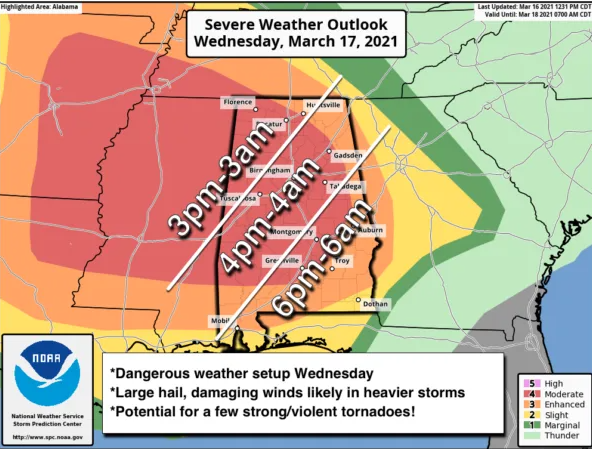The Birmingham Times
The risk of severe storms will begin Wednesday afternoon, continuing well into Wednesday night, in places like Birmingham, Montgomery, Tuscaloosa, Anniston, Gadsden and Florence, according to the Storm Prediction Center (SPC).
Thunderstorms are likely Wednesday morning over the northern quarter of the state along a northward-moving warm front; some of these could be strong. The afternoon storms Wednesday will be widely scattered, most likely, but where they form they could be severe. The more organized thunderstorms arrive Wednesday night.
Here are some important points about preparedness:
- Have at least two ways of hearing warnings. Every Alabama home and business needs a NOAA Weather Radio; the model most used is the Midland WR-120, available at most big box retailers. Weather radio receivers do not rely on cellular networks and are very reliable. The second way is your phone; be sure Wireless Emergency Alerts are enabled, and have a reliable app like the ABC 33/40 Weather app, which also pushes warnings. Never rely on an outdoor siren. NEVER.
- Know your safe place. In a site-built home, it is a small room on the lowest floor, near the center of the house, away from windows. In that safe place, have helmets for everyone (this means adults too). We also recommend a portable airhorn for everyone (to alert first responders if you need help), and hard-soled shoes in case you have to walk over a tornado debris field.
- You can’t stay in a mobile home during a tornado warning. Know where you are going and how to get there quickly. If there is no community shelter nearby, go to a business like a gas station, convenience store or restaurant that is open 24/7.
- Be sure you can find your home on a map. Identify the county you are in and the ones surrounding you. Map skill is very important on severe weather days.
Storms dumped as much as six inches of rain on Mississippi and Alabama on Tuesday ahead of threatening weather that forecasters said could include tornadoes across a large part of the South from Texas to Georgia.
With isolated flooding already being reported in western Alabama, the SPC said hail as large as tennis balls and intense twisters were possible across the region Wednesday. More than six million people live in an area stretching from eastern Arkansas to eastern Alabama that forecasters said was most at risk.
More than a dozen Alabama school systems canceled classes, planned online sessions, like Birmingham City Schools, or announced early dismissals because of the threat. More could be added to the list. Storms likely will intensify in waves during the afternoon, forecasters said, and the worst wasn’t expected until overnight.
“This is going to be a long-haul type of event,” said Gary Goggins in the National Weather Service office for central Alabama, where Gov. Kay Ivey issued a state of emergency for all 67 counties that would make it easier to provide state aid if needed.
Forecasters issued tornado warnings in southwest Alabama as storms moved through early Tuesday, but no damage was reported immediately. Schools in Cullman County, north of Birmingham, delayed opening because of downpours. Rainfall was particularly intense around the Mississippi-Alabama state line, where as much as six inches (15 centimeters) fell.
“’We did get a strong band of pretty heavy precipitation,” said Ashlyn Jackson, a forecaster with the weather service in Jackson, Mississippi. “We’ve been getting hit pretty hard.”
On Wednesday, strong twisters that stay on the ground for an extended period are possible in a region that includes large parts of Arkansas, Mississippi and Alabama as well as parts of Louisiana and Tennessee, forecasters said. Residents need to pay attention to alerts in cities including Memphis, Tennessee; Birmingham, Alabama; and Jackson forecasters said.
Large, outdoor sites for administering COVID-19 vaccinations around Birmingham and Memphis canceled appointments because of the threat of severe weather. With people getting vaccine shots in their cars, officials were concerned that strong winds, rain, hail and the threat of tornadoes could make the operations unsafe.
Associated Press and James Spann/alabamanewscenter.com contributed to this post.





